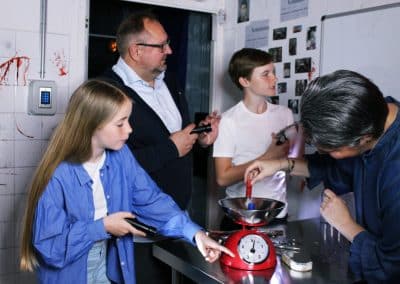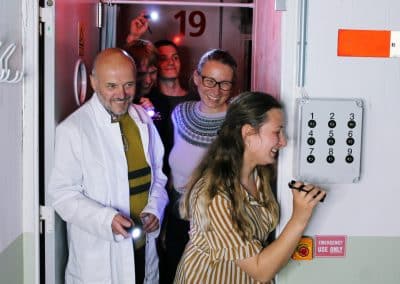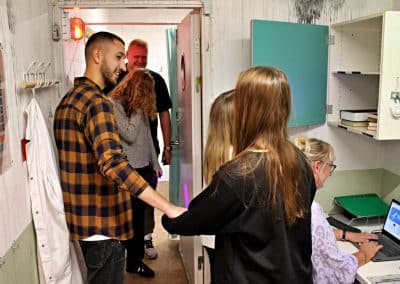Escape room experiences for the whole family
The bravest members of the family are the first to make their way through the dark corridors of the zombie-inspired Escape Room. Only one padlock remains to be opened before they're free - but can they find the final clues to solve the puzzle together?
Escape rooms have become popular with all age groups.
This is where the magic of escape room experiences for the whole family unfolds. From strategic thinking to team collaboration, every participant, regardless of age, can contribute valuable insights.
Choosing a family-friendly escape room
When choosing a family-friendly escape room, it's essential to focus on the theme and its difficulty level. It's ideal to look for escape rooms that offer engaging storytelling but aren't too difficult - especially if it's your first time trying an escape room. It's all about balancing the elements of suspense and mystery as well as education to ensure an engaging and educational experience for both children and adults.
When it comes to the level of creepiness, at LOCKED we have the most slightly creepy rooms, but we also have rooms that are simply exciting - for example, the "Undercover" room, where you are agents who have to steal back top secret documents.
Age limits and difficulty levels
In escape rooms, access for children is often age-differentiated - determined by indicative age limits based on the theme of the room and the complexity of the puzzles. At LOCKED, we always recommend that children are accompanied by adults. That's why it's ideal to try escape rooms together as a family.
At LOCKED escape room, we always recommend that children are always accompanied by adults - so it's ideal to try escape rooms together as a family.
To create a successful experience for all generations, it's essential to choose the difficulty level carefully to match the abilities of both children and adults, without excluding any participants.
Themes that captivate children and adults
To ensure an engaging experience for the whole family, escape room themes need to be broadly appealing. The ideal theme will spark curiosity and interest across age groups and ensure that both children and adults feel included.
- Movie universe: themes from famous movies/series make it easy to immerse yourself in the theme. For example, we have the theme "The Undead" which is inspired by the hit series "The Walking Dead".
- True Crime: Here you can challenge your inner investigator/CSI agent by trying "Crime Scene" or "Zodiac".
- James Bond/007: Our "Undercover" theme is suitable for those participants who don't want spooky, just exciting. This theme is slightly James Bond inspired.
This requires that the theme is carried through in all aspects of the space, from puzzles to decor. This creates a synergy between narrative and interaction that is essential for an immersive family experience.
The theme should not only be entertaining, but also stimulate educational value. Herein lies the key to creating a memorable and educational family activity that will be the subject of dialog and community long after the escape from the escape room.
Preparing for the escape room adventure
Before entering the wondrous world of the escape room, it's a good idea to prepare. This means making sure all family members are briefed on the game and rules. It's important that everyone keeps an open mind and is ready to embrace the challenges the room will present. A good understanding of the concept contributes to an immersive and connected experience.
Choose a theme that sparks collective interest and anticipation.
The most important skills in an Escape Room
To succeed in an escape room, you need to master it:
- Communication: The ability to exchange thoughts and ideas accurately and quickly with other participants.
- Observation skills: Attention to detail and awareness to discover hidden clues and connections in the room.
- Logical thinking: The capacity to analyze information and develop rational solution strategies.
- Stress management: Being able to stay calm and focused even when time pressure intensifies.
- Creativity: The ability to think outside the box and apply unconventional solutions.
Strengthening these skills will increase the chance of escaping an escape room.
Collaboration as a success factor
Team collaboration is essential for success.
When families enter an escape room, they take on a common goal. Collaboration within the group is essential and can make or break an escape. Each member brings unique skills and perspectives that should be valued and utilized to the fullest. Coordination and division of labor is crucial as time is a scarce resource.
An escape room quickly becomes a dynamic environment - a mix of excitement, curiosity, and time pressure. Only through effective communication, respectful listening, and strong decision-making can the challenges be overcome. Without collaboration, the group's potential will not be fully realized.
Success in an escape room is built on the ability to collaborate.
Through the synergy of the group's efforts, complex problems are broken down and solved. It requires all members to engage in the process and be patient with each other's ideas and insights. This fusion of creativity and collaborative thinking often leads to the most innovative solutions. This makes it clear that collaboration is not just part of the game, but the core to triumph.
During the escape room experience
During the escape room experience itself, where family dynamics come into play, it's essential that communication is open and inclusive. Children and adults often experience the game differently, with varying approaches to problem solving and concept understanding. For example, children may be worse at managing time pressure but incredibly creative in their thought processes. For everyone to enjoy and actively contribute to the game, it requires a customized approach that respects and includes the unique skills of all family members.
The goal is to create an immersive and memorable experience for the whole family, where collaboration and teamwork are key to success. It can be beneficial to discuss a strategy for the division of labor beforehand; who will be the detail-oriented explorer, who thrives on solving puzzles and who can keep an overview? These roles can change dynamically throughout the game, depending on the individual tasks and challenges. It's equally important to understand that failure is part of the learning process, which means embracing and learning from them to improve your family's overall performance and enjoyment of the escape room experience.
Roles and tasks
For a successful escape room, it is essential to establish clear roles and tasks within the team, which optimizes the overall skills of the group.
- The detail-oriented: The person with an eye for small clues and hidden mechanisms that are often crucial.
- Riddle Breaker: The family member who thrives on problem solving and can decipher complex puzzles.
- Time manager: An essential role that keeps the group on time and focused on the goal.
- Organizer: The person who creates an overview by coordinating the team's efforts and ensuring effective communication.
- Creative Problem Solver: A family member with a unique mindset who can think outside the box.
Dividing roles based on individual skills and preferences facilitates a more fluid and engaging game.
It's important that roles are not static, but can be rotated between family members depending on the nature of the tasks to promote dynamic interaction.
Tips for effective problem solving
The essential foundation for problem solving in an escape room is communication. It requires all voices to be heard and information to be shared openly, which enhances collective insight and increases the chance of solving tasks quickly.
Make full use of each individual's unique strengths. Discuss who takes on which task based on personal experience and skills.
Effective time management is essential. So make sure you keep an eye on the clock - we always recommend getting a clue if you've been stuck on the same puzzle for more than 10 minutes.
To maximize efficiency, be open to different solution approaches and avoid tunnel vision. This also means switching strategies if barriers are encountered.
Finally, remember to celebrate the small victories along the way. This builds team dynamics and keeps morale high, which is crucial for overall task completion.
After the escape room adventure
After participating in an escape room, it's essential to reflect on the experience together. This often results in a lot of laughter, but can also create a deeper understanding of the dynamics that unfolded during the experience and provide a space for discussion of the strategies used. The development of collaboration and problem-solving skills observed can also be applied to future situations outside of the escape room setting.
It's important to recognize each family member's contribution and celebrate the joint work that led to a successful escape from the room. These moments can help strengthen relationships and foster a sense of community that lasts long after the game has ended.
Next steps: More escape rooms?
Incorporating multiple escape room experiences into family activities can be incredibly rewarding. This opens up a huge development in the ability to work together under pressure.
Escape rooms offer a unique combination of entertainment and learning - and are actually one of the few activities where participants can have equal fun across generations.
After an escape room experience, families have the opportunity to see how they tackle diverse scenarios together and grow as a unit.
Reviews






